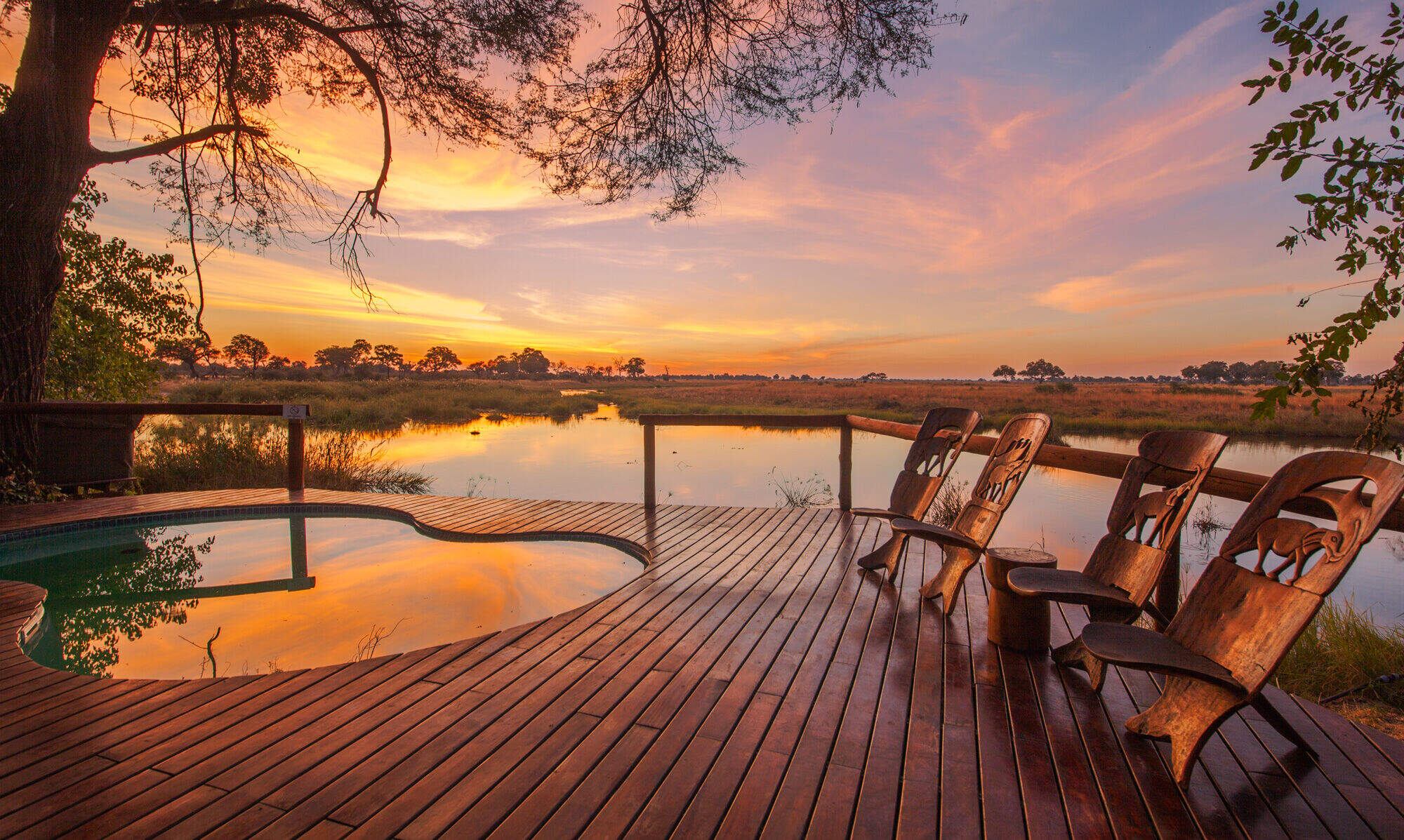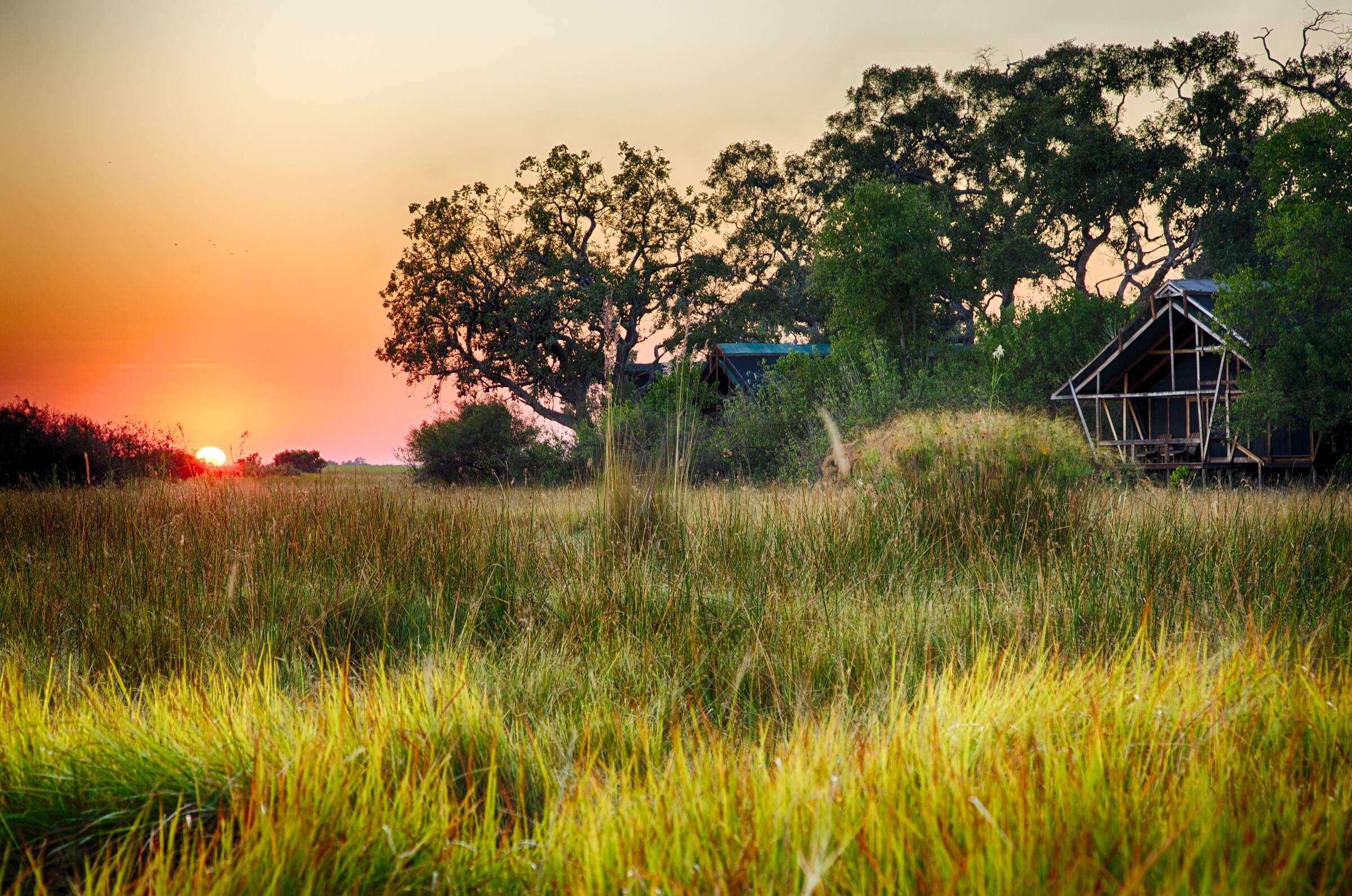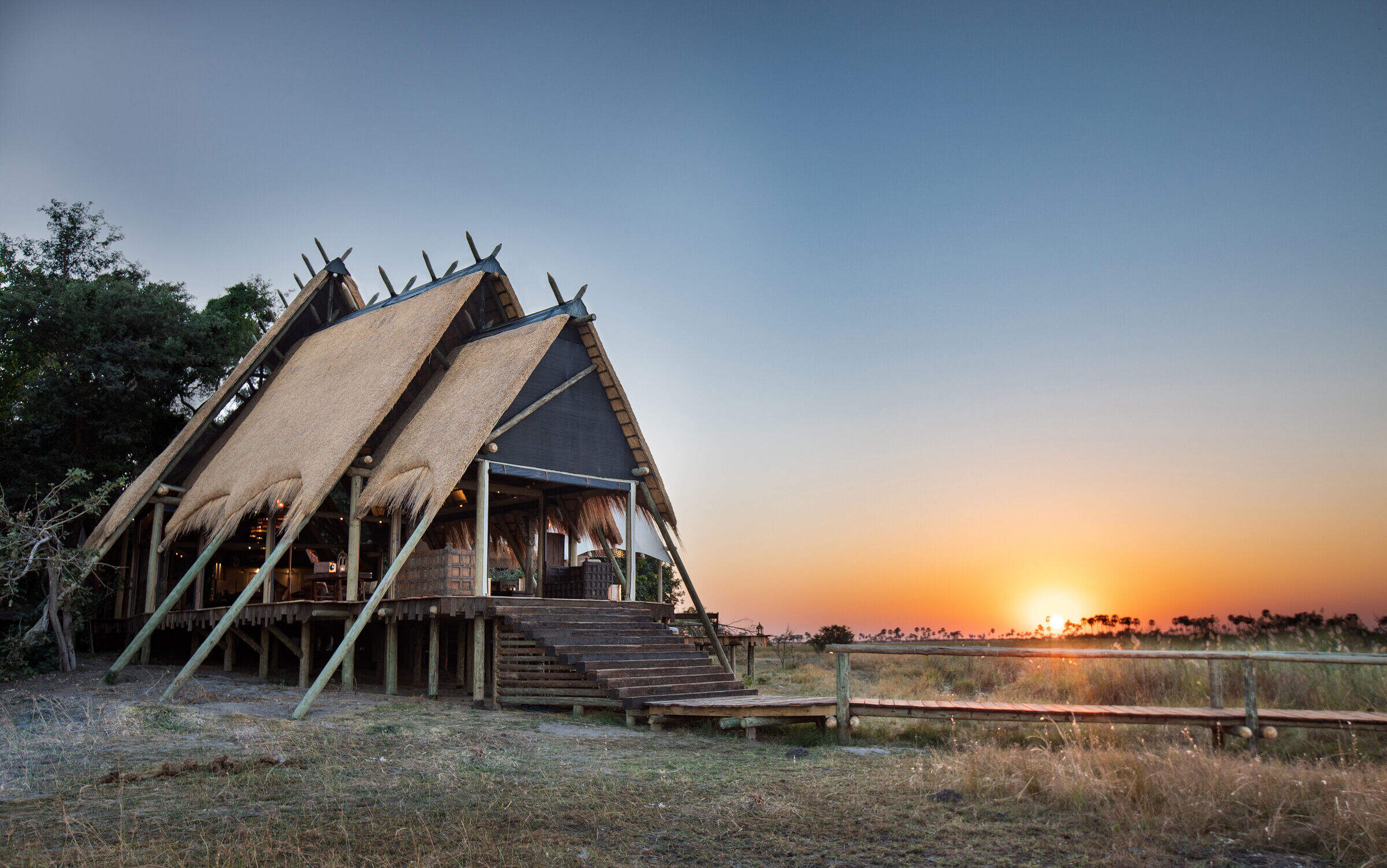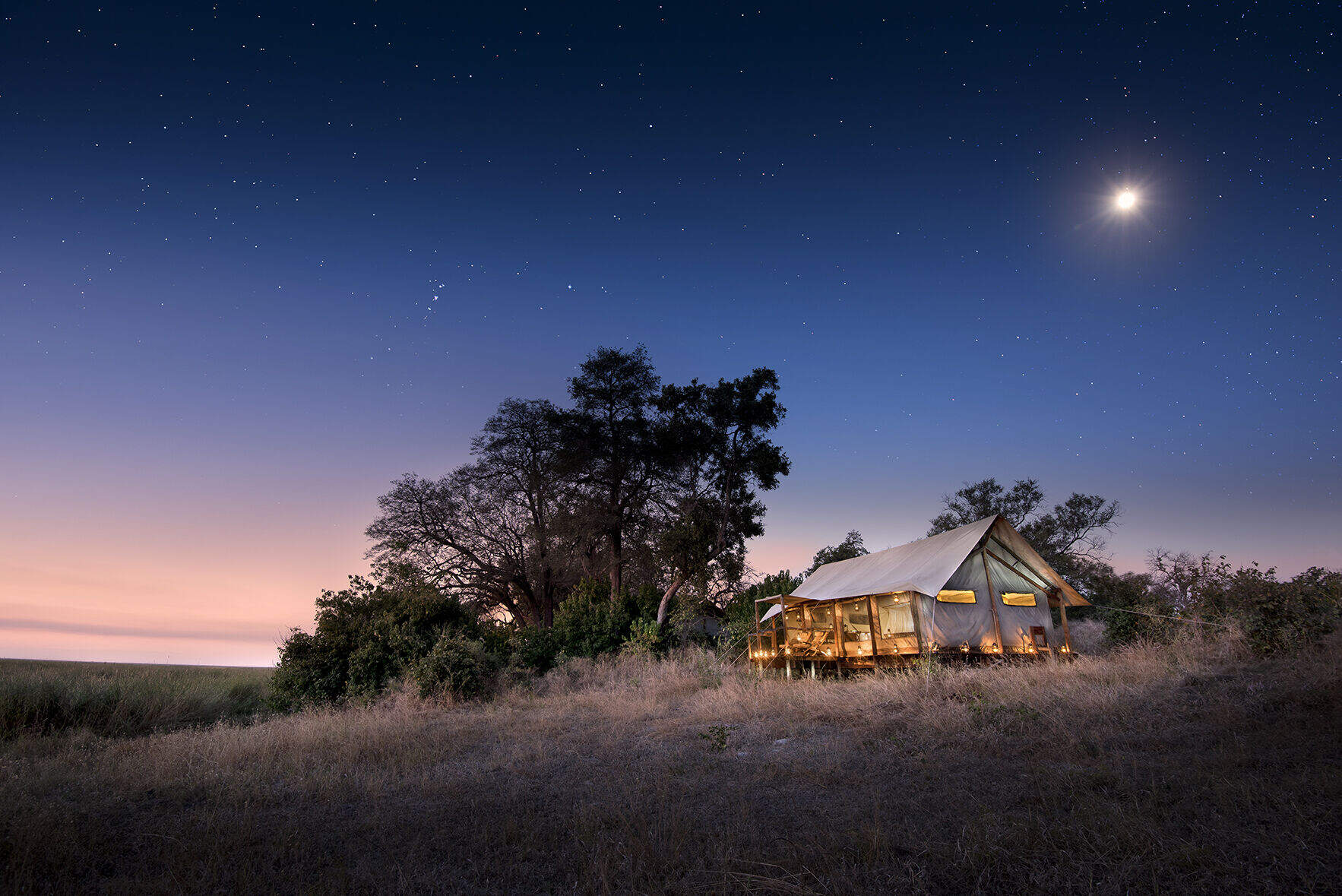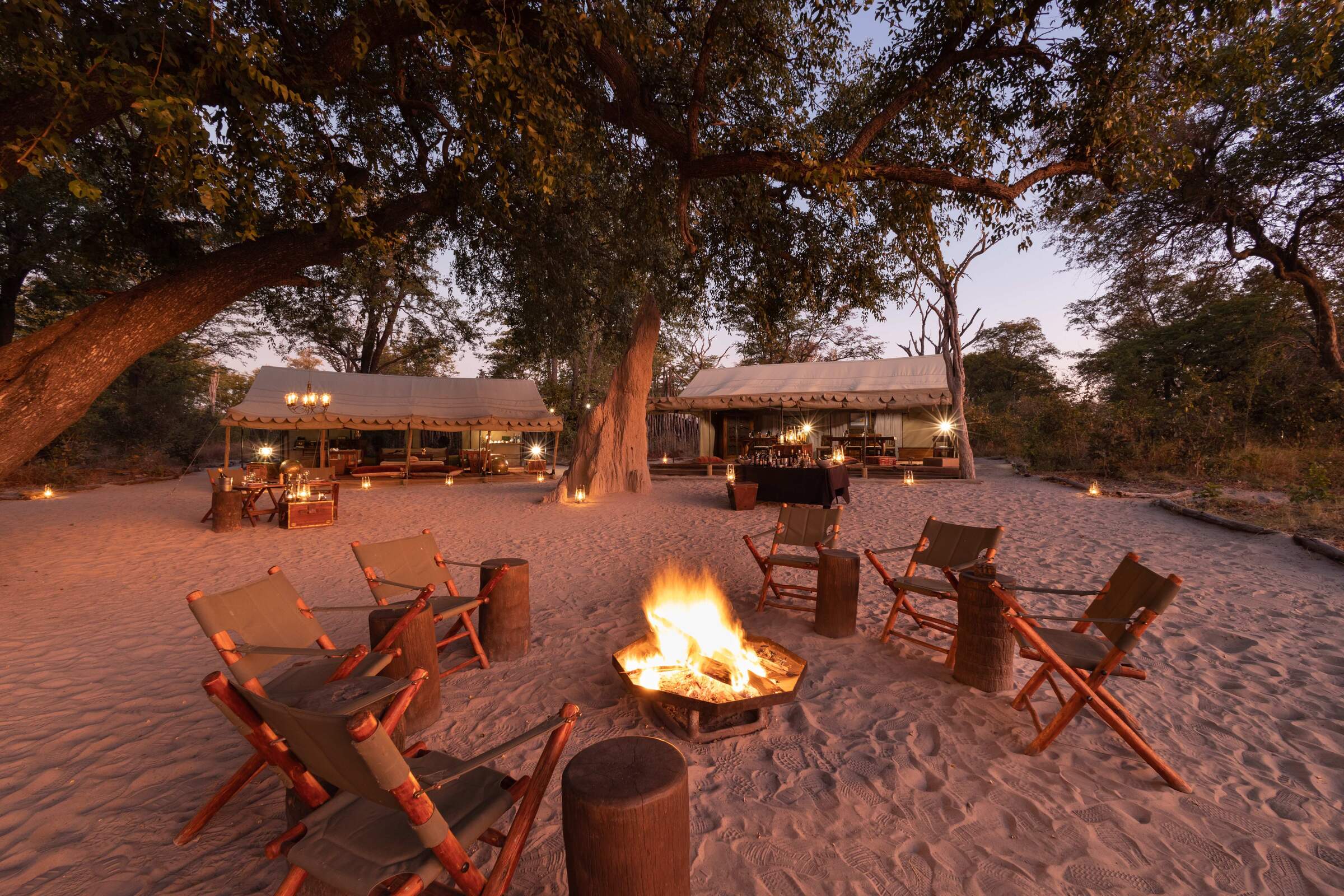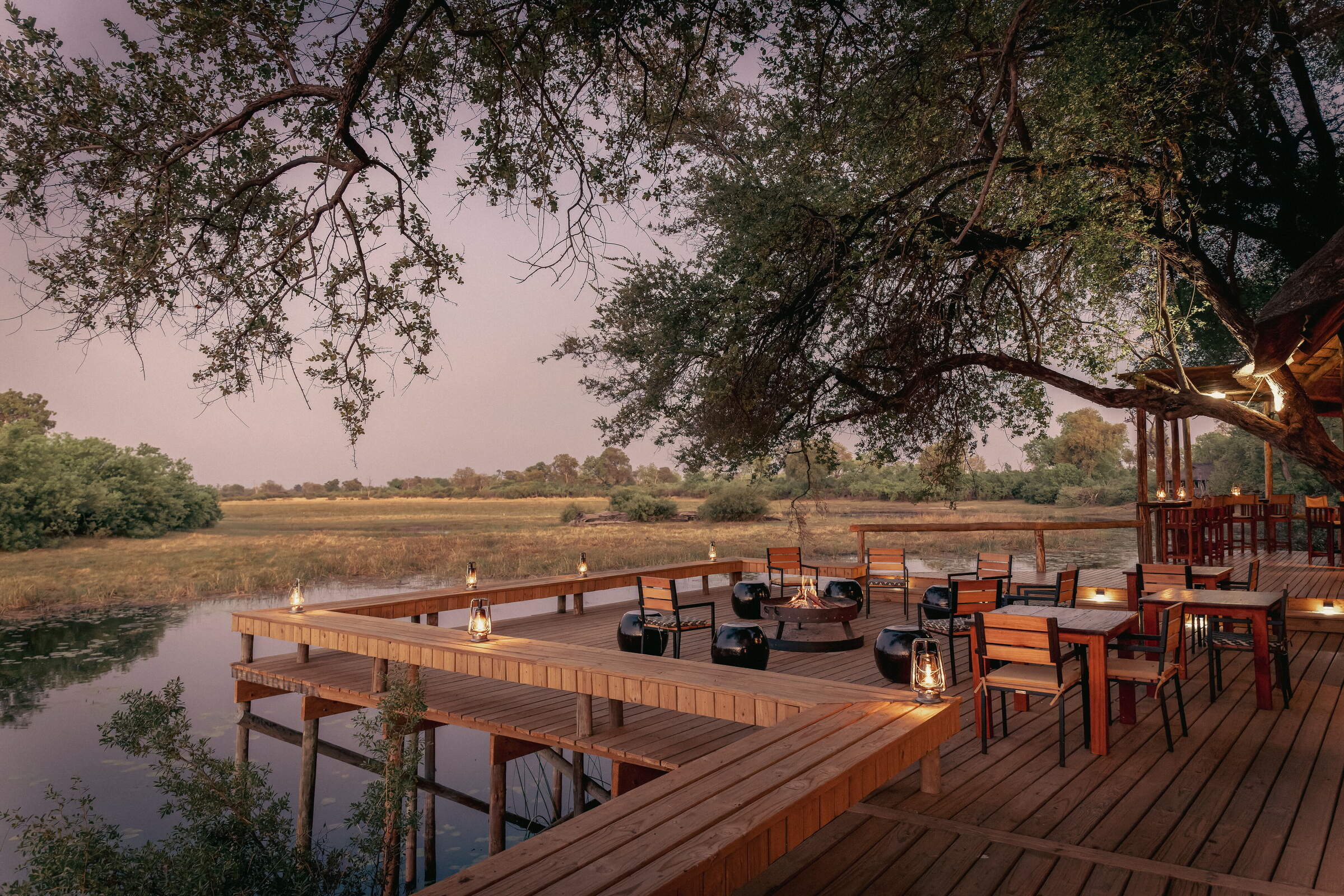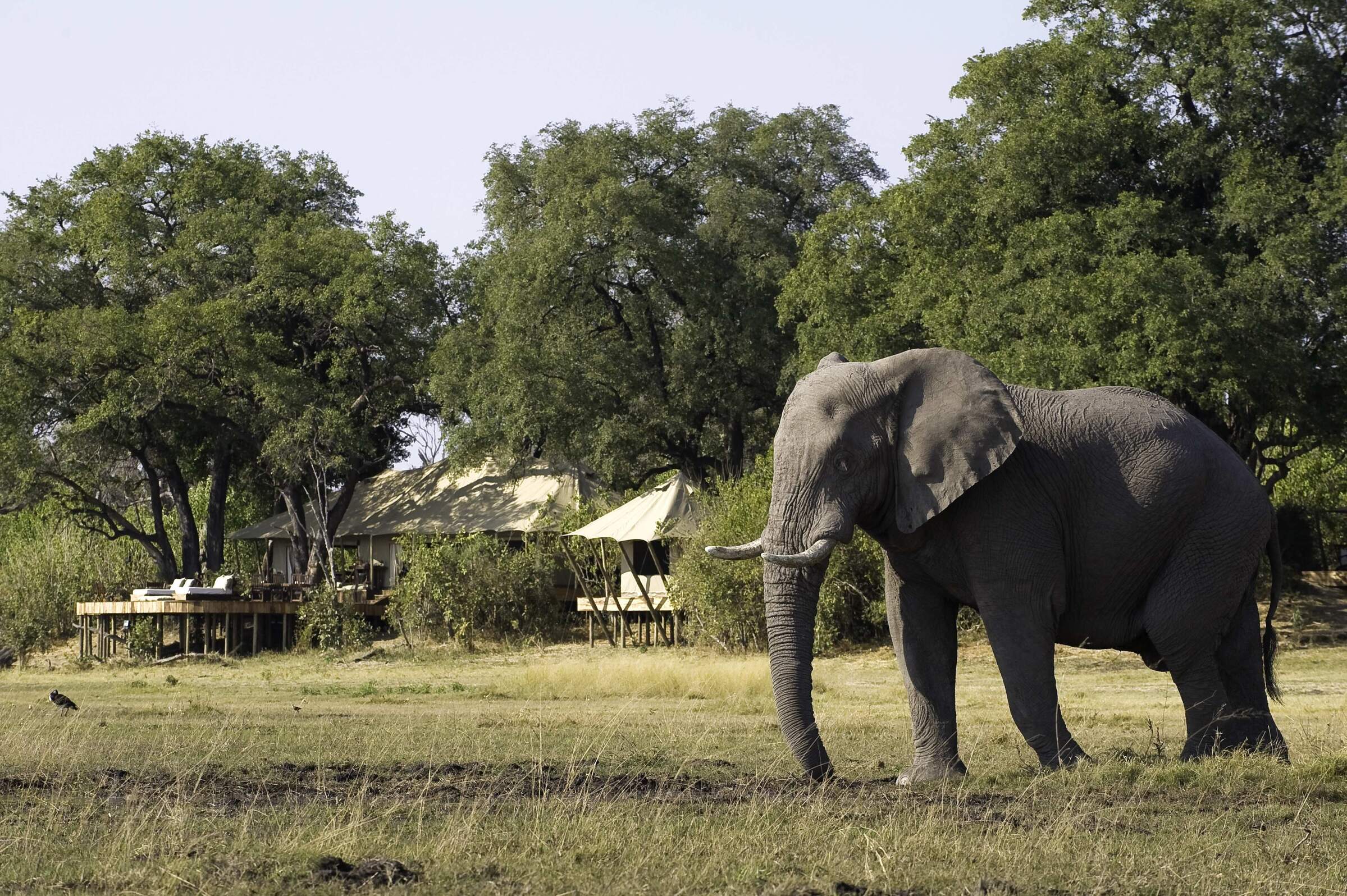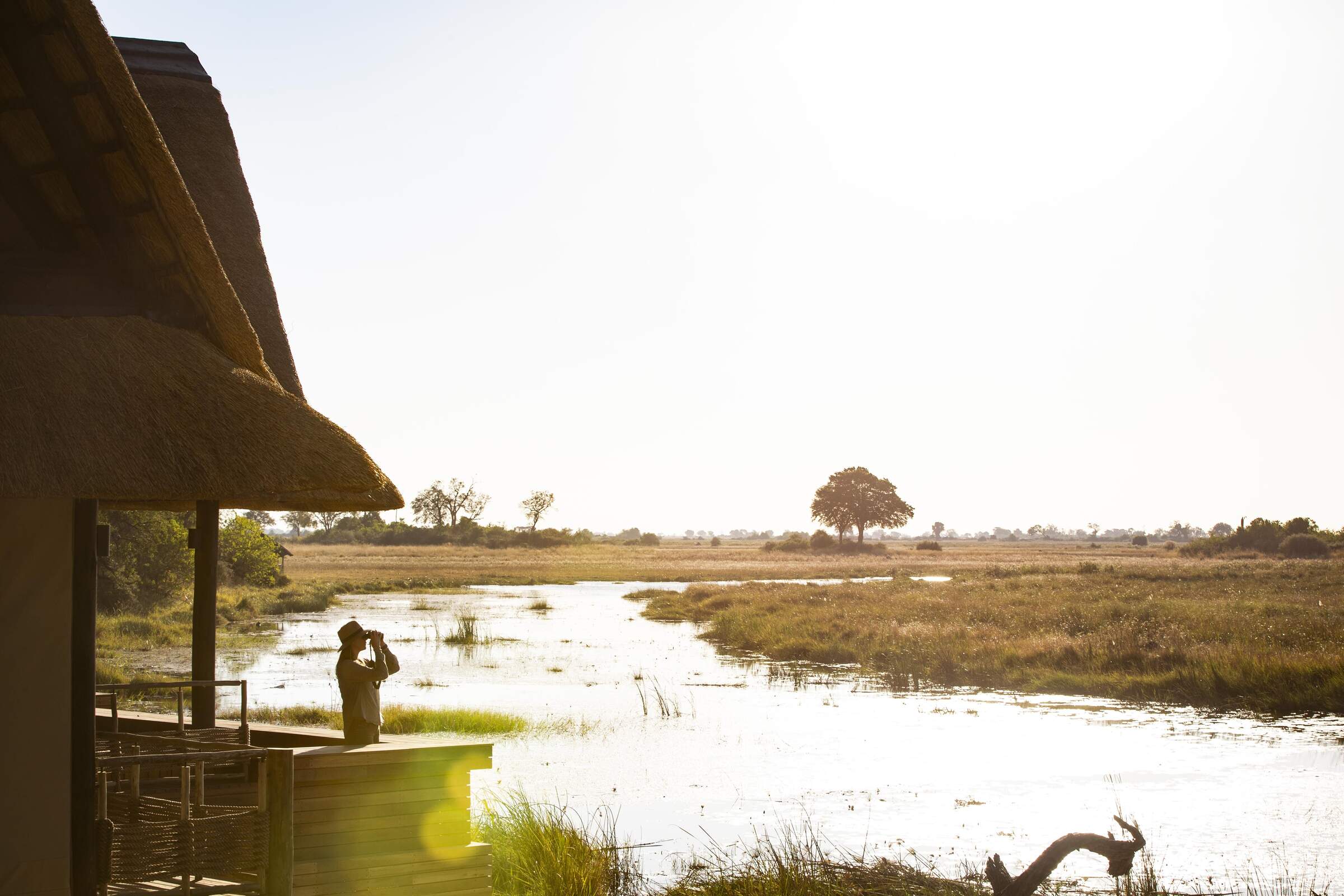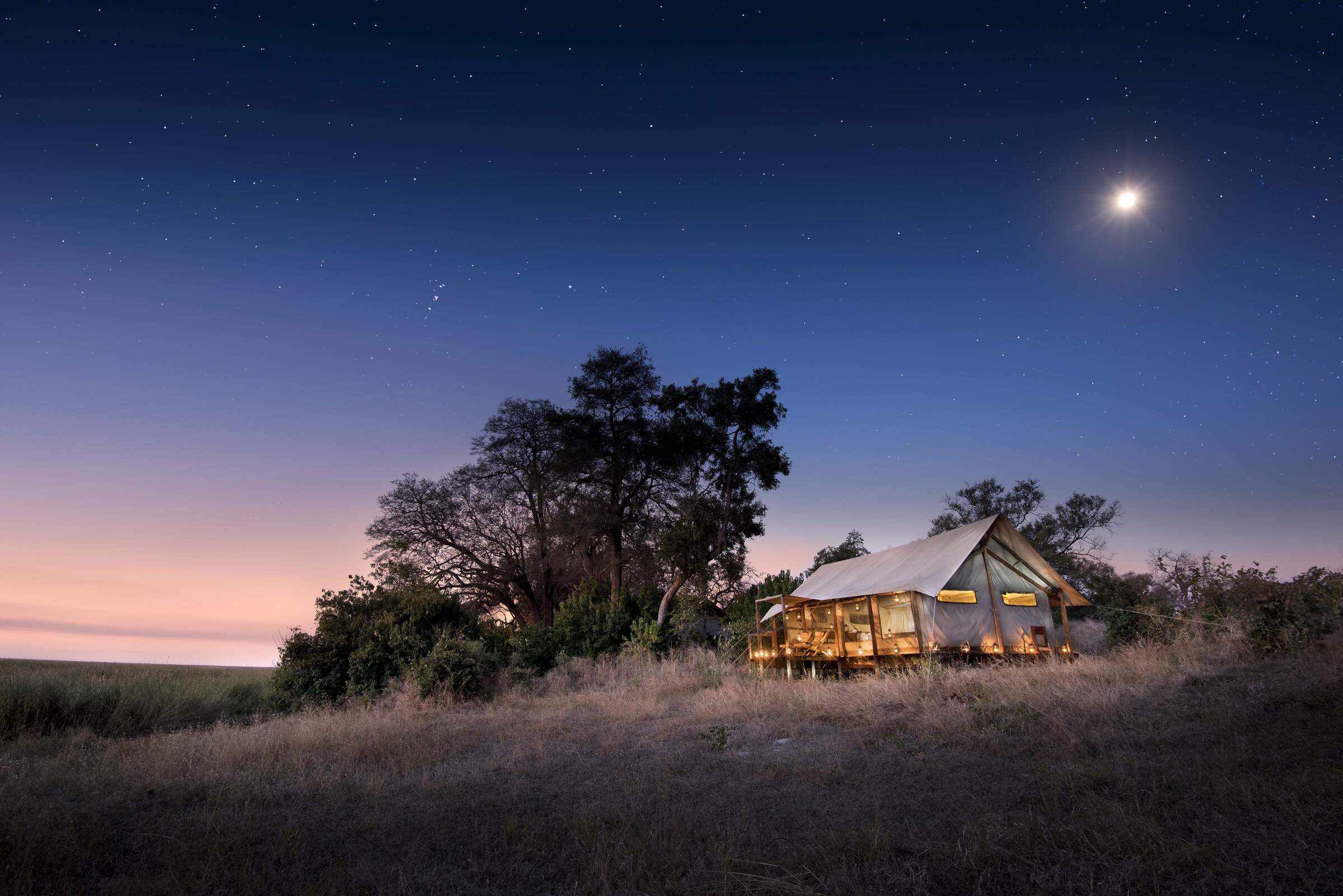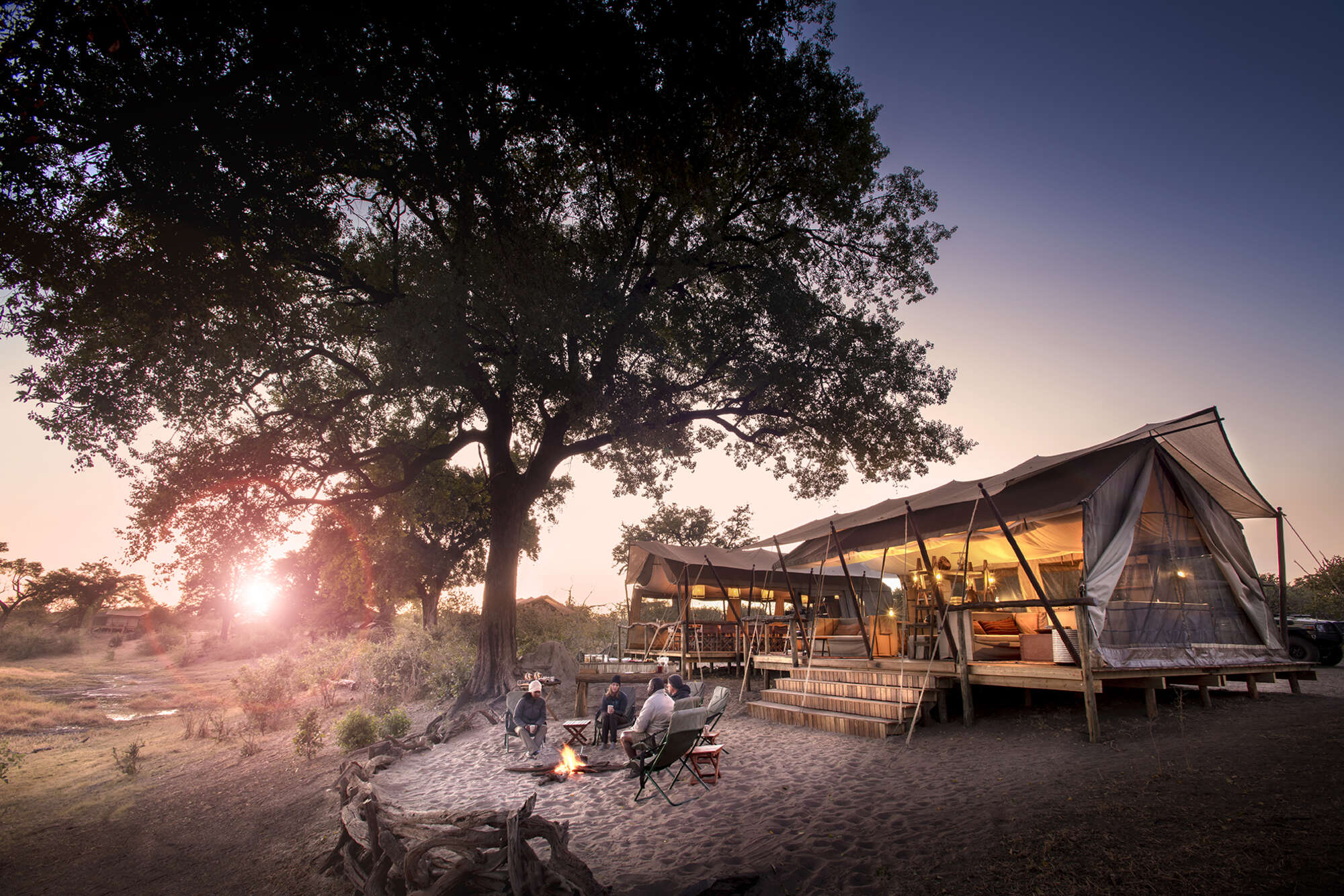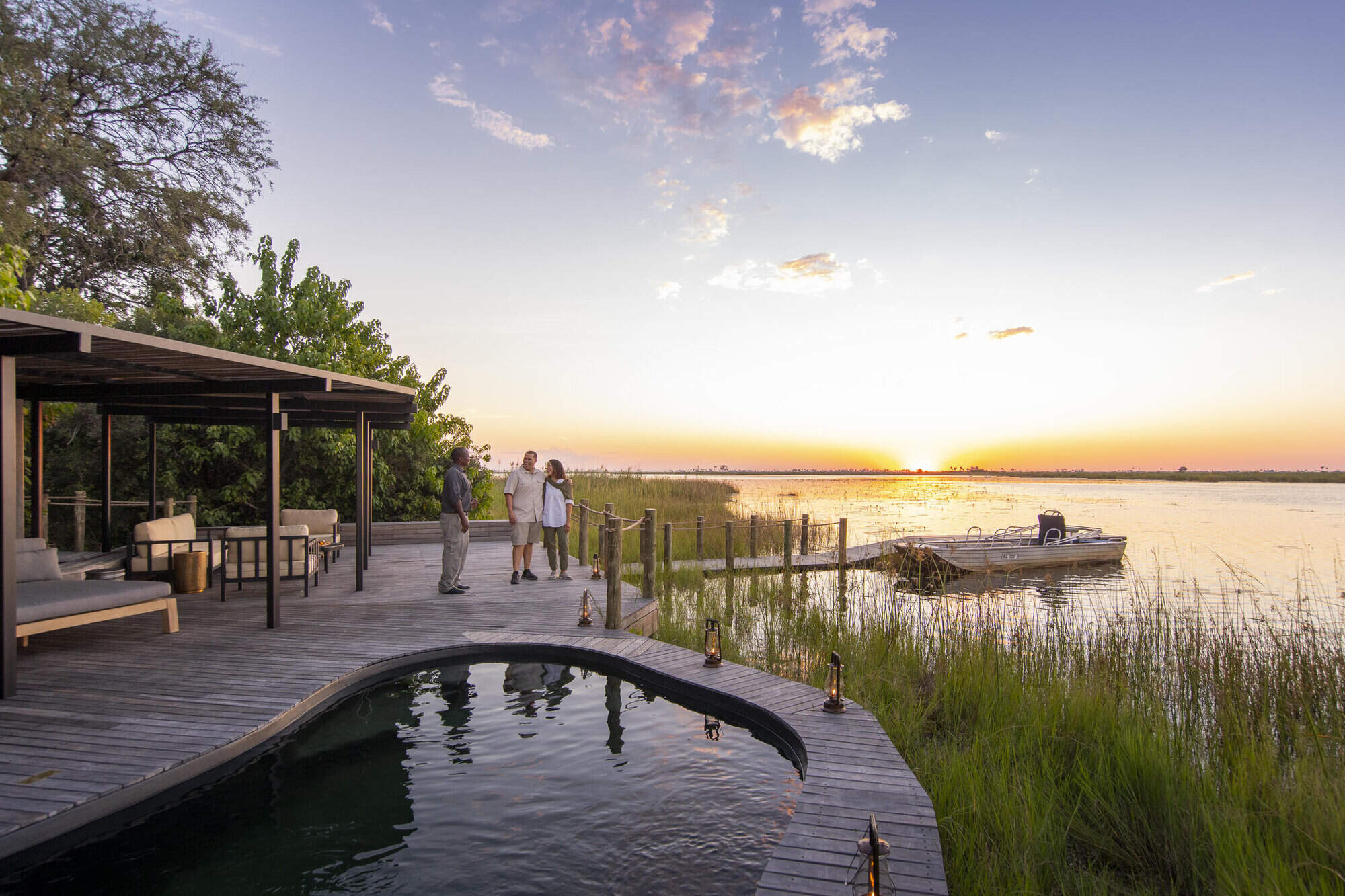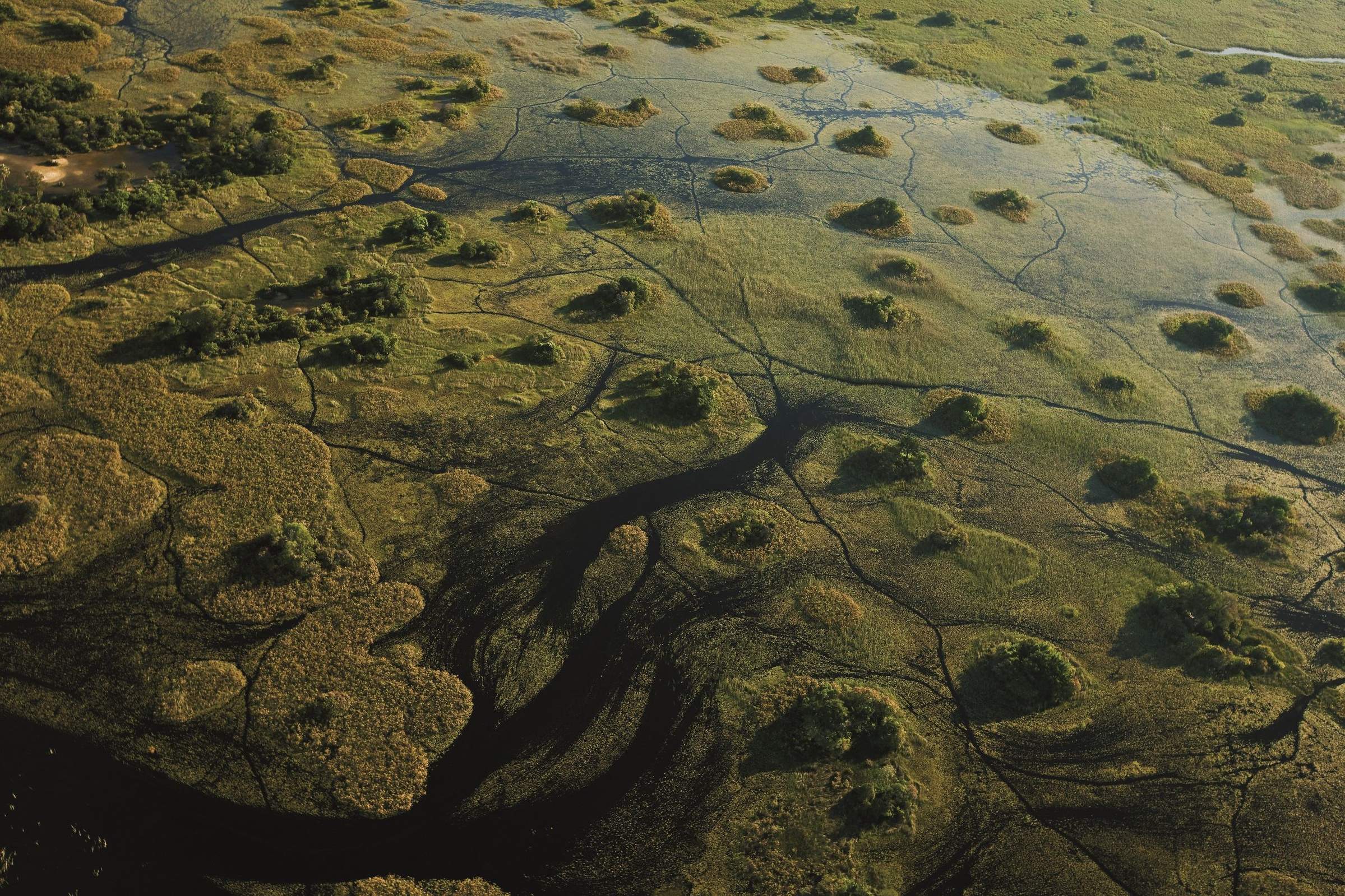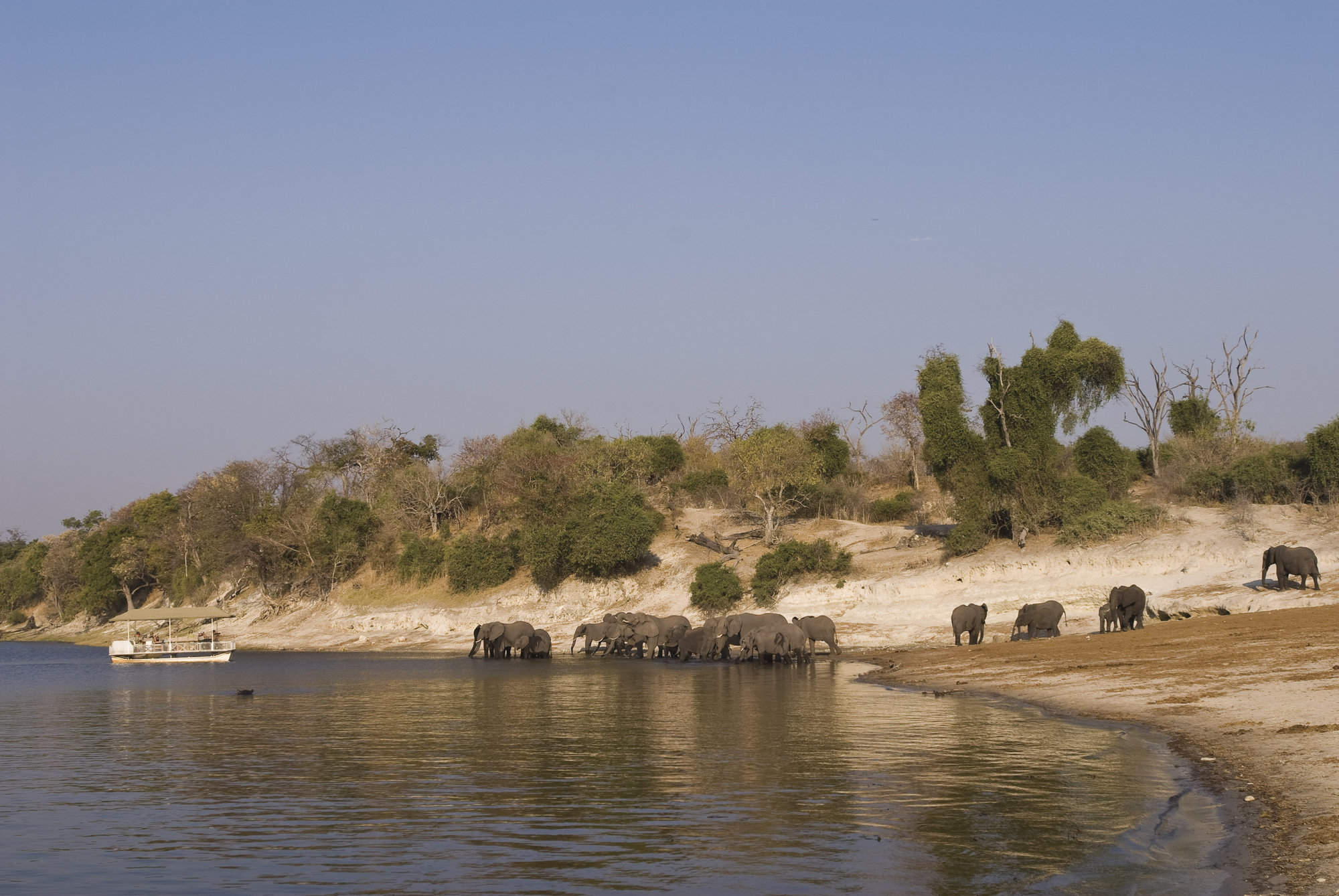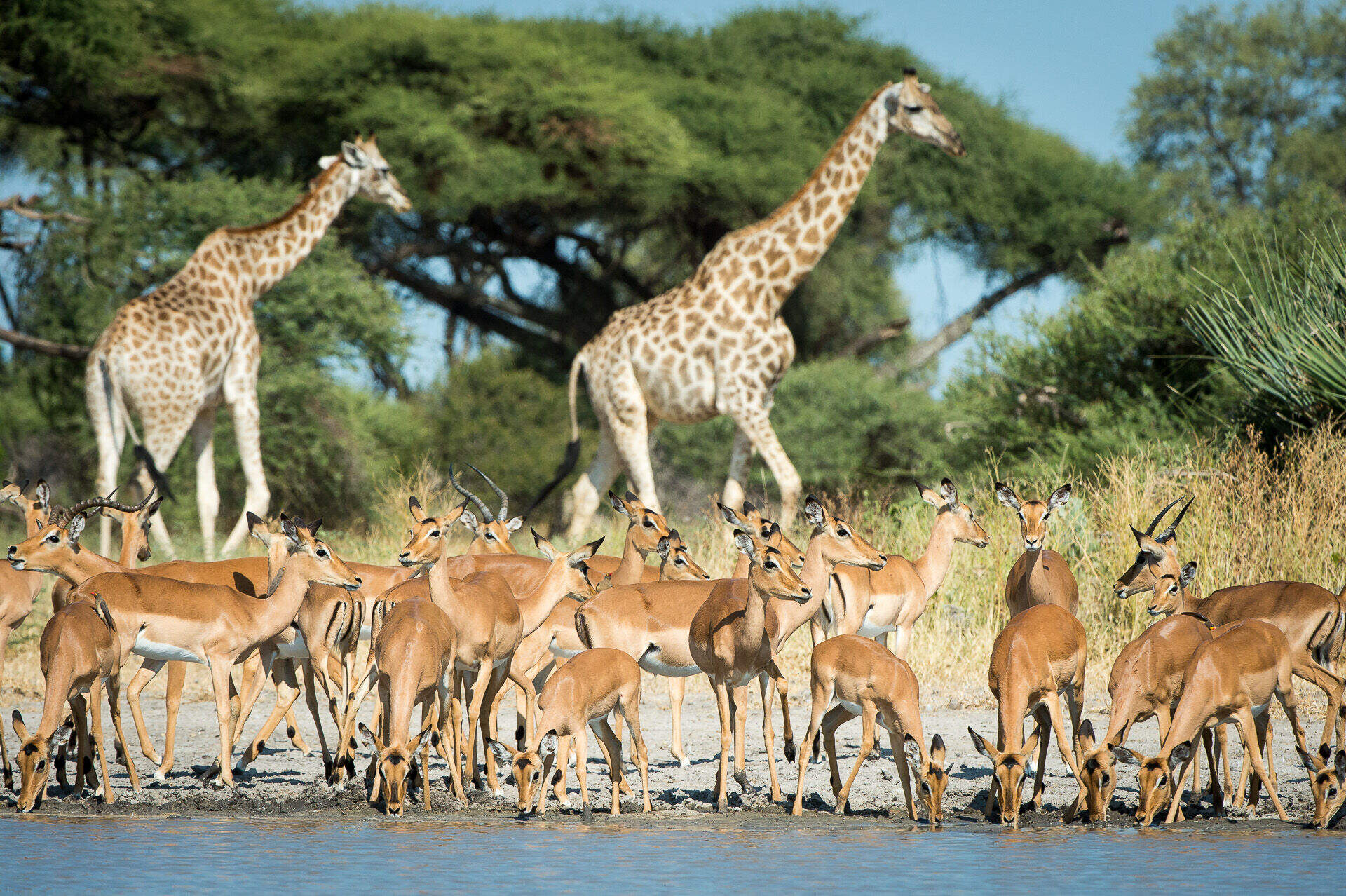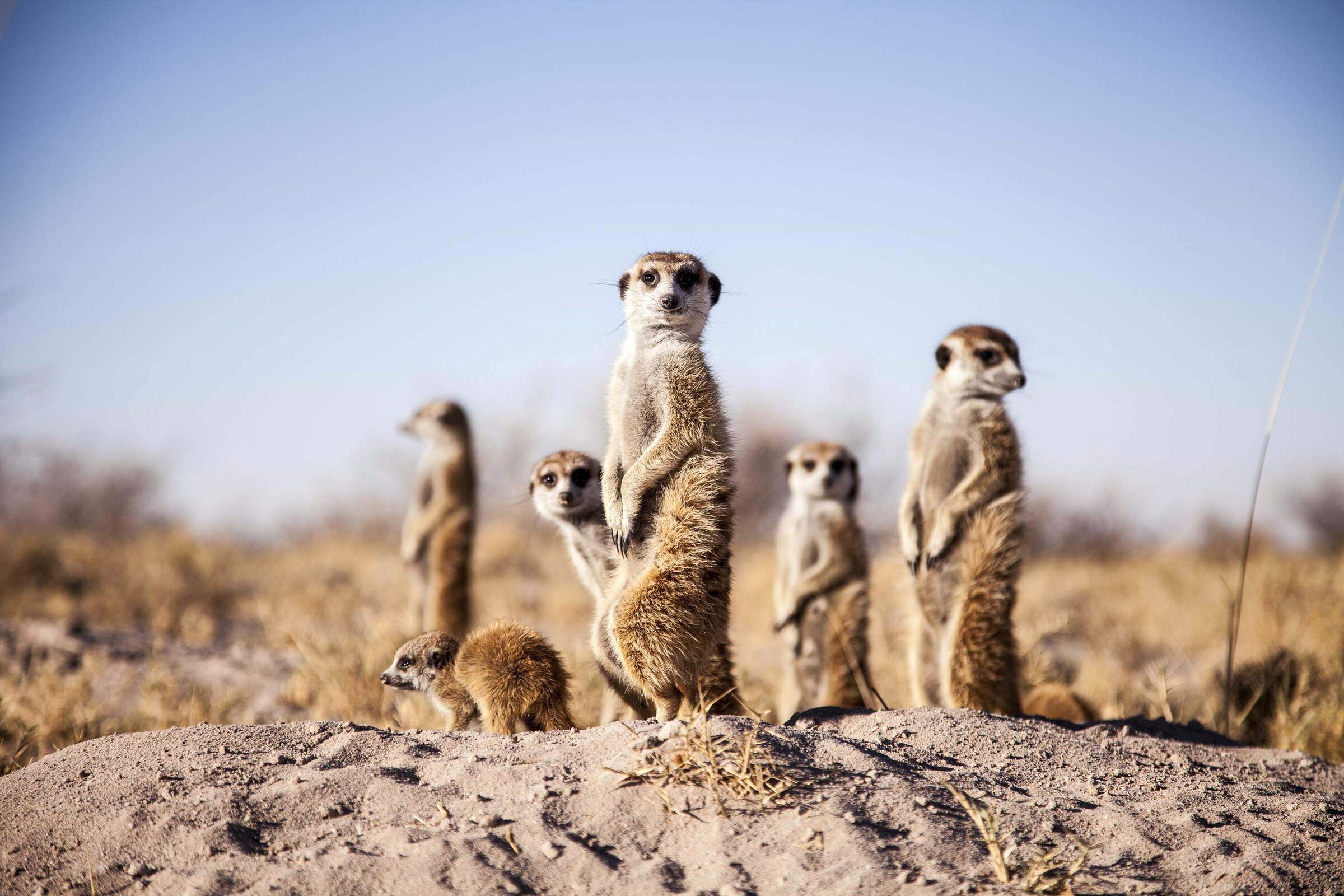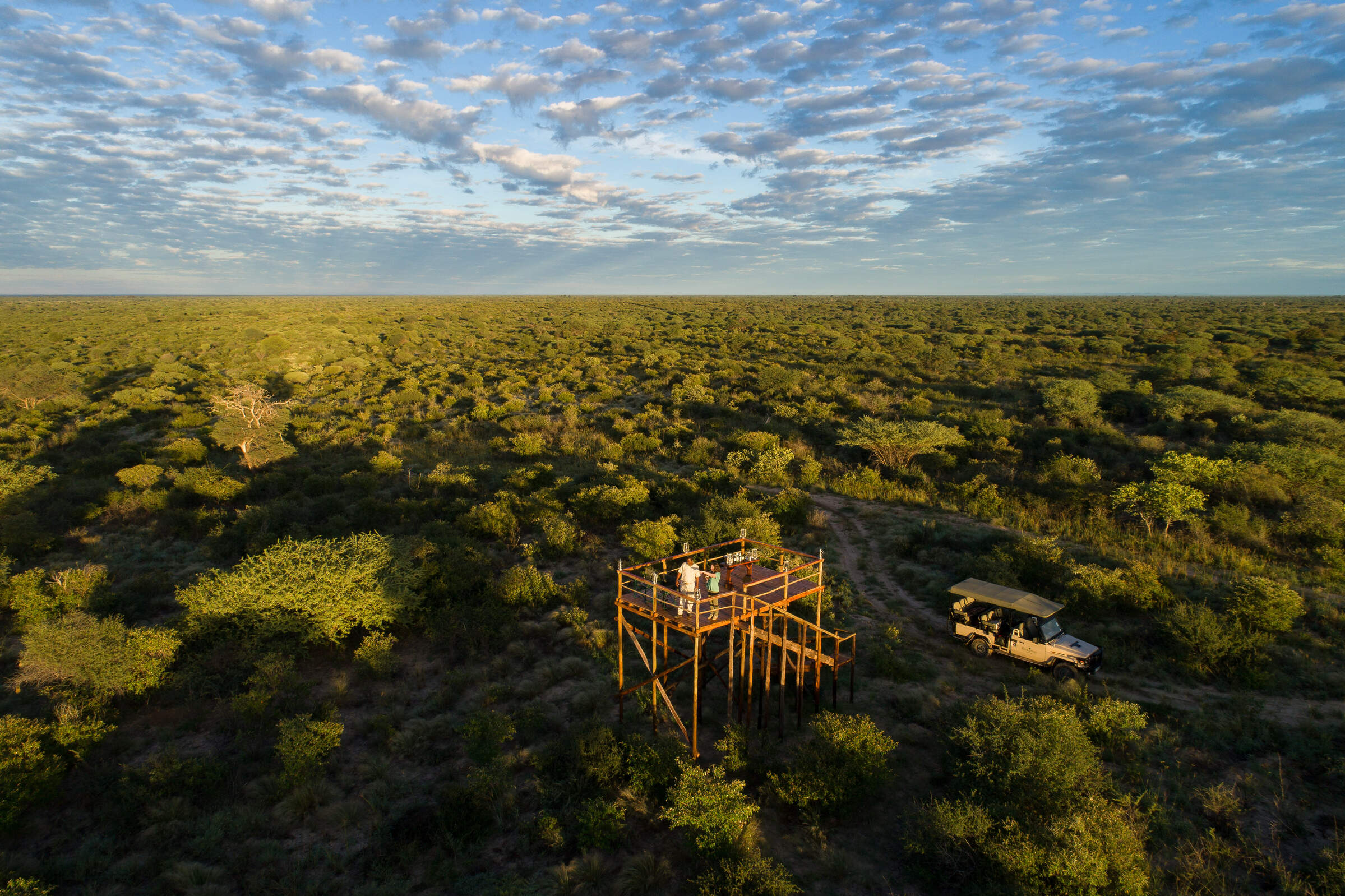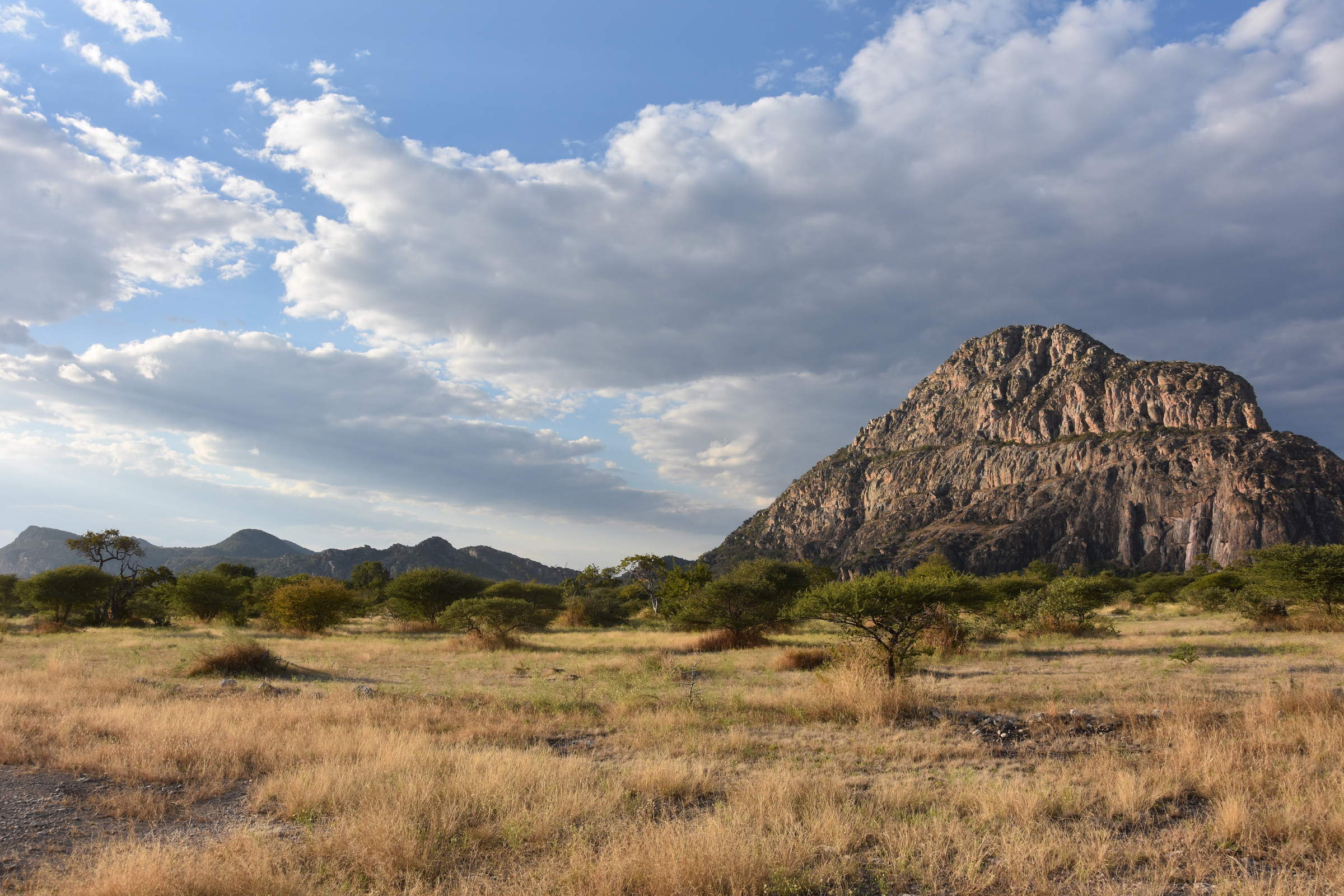DumaTau Camp: Our full report
Originally opened in 2000, Botswana's tented DumaTau Camp has been rebuilt and reinvested a number of times ...
... and is now a premier luxury camp sitting beside the Linyanti River, not far from the original camp. It overlooks a lagoon and expansive swamps within the extensive, private Linyanti Reserve, where wildlife safaris are possible year round.We are in the process of updating this lodge page to reflect Duma Tau's latest upgrade.
In topography, this area of northern Botswana is similar to the northern riverfront of Chobe National Park. The permanent waterways are fringed by riparian forest, and dense woodland (mostly mopane) stretches away to the south. DumaTau itself lies close to the Zibadianja Lagoon (the source of the Savuti Channel), under towering jackalberry (African ebony), sausage and mangosteen trees.
The décor at DumaTau is contemporary and light, almost Scandinavian in feel. The raised main area is split across two wooden-framed tents, divided by a central walkway. During our last stay in August 2018 the canvas walls were rolled up, but can easily be closed for wet or windy weather.
The large dining area is both decorative and functional, with a self-service coffee and tea station. Silver platters hold water glasses and mugs; and during mealtimes food platters sit atop wooden logs on the table. Cheeky hornbills often keep camp guests entertained with the occasional opportunistic fly past – especially at brunch.
Dining is usually communal at DumaTau, while private meals can be organised on request. During the winter months, gas patio heaters help ward off the chill of the early mornings and late evenings.
The light wood and natural coloured furnishings of the lounge at Duma Tau Camp make a nice change from the more traditional safari décor. Along with an array of sofas and armchairs, a large desk, old tin and wooden cabinets, old trunks and vintage lamps, are a good selection of photography books. To the front is a cleverly designed bar which allows uninterrupted views over the river.
Steps lead down to a wooden floating jetty, which opens up to a circular area with a boma and deckchairs, while moored alongside is a very comfortable floating barge, set out with sofas. There is also a well-stocked curio shop to one side of the main area.
Raised wooden walkways lead through the bush to DumaTau's ten tented rooms, which are spread out along the river on each side of the main area. To the front, overlooking the water's edge, each has a large raised veranda with comfortable rattan chairs. The tents are substantial, constructed on wooden decks beneath a canvas roof, with mesh walls that allow guests to enjoy the surrounding landscape. At night, the room attendants roll down the canvas tent flaps for privacy and to keep out any chilly breezes. Two of the rooms are designed for families, but as they consist of two separate tents joined by an open deck, children under 12 must share a room with an adult.
Each tented room at Duma Tau is entered through a wooden door secured with a latch, to reveal large double or twin beds surrounded by a mosquito net, and with a fan overhead. On either side are reading lights set on square leather-trimmed luggage trunks. The rooms follow a similar soft colour palette to the main area, with whitewashed wooden floors, brown striped floor rugs, and natural-coloured furnishings. In one corner is a desk with an assortment of stationery, power plugs and reference books, as well as a floor-standing fan; in another, an ottoman chair takes pride of place beside a small table. Tea- and coffee-making facilities and filtered drinking water are also provided.
Behind the bed is a luggage rack, a long mirror and a wardrobe that houses a digital safe, emergency radio, blankets, bug spray and two cotton dressing gowns. A curtain divider separates the bedroom from the en-suite bathroom, where his-and-hers copper basins are set on a wooden washstand overlooking the river. Both the flush toilet and rain-head shower are enclosed in separate cubicles.
DumaTau Camp is spread out along an extensive stretch of the river, with a swimming pool at one end, just beyond tent number 10. If you are in tent 1, it is a decent ten-minute walk to the pool. For some this will be a welcome walk after sitting sedentary in a vehicle. It's an inviting spot, surrounded by decking, and dotted with very comfortable sunloungers and umbrellas. There is also a changing area and loo so there is no need to take the long walk back to your tent. Hidden in the reeds on the other side of the pool, a small jetty with a floating hide and a comfortable sofa is a secluded place to watch birds or just read a book.
The focus of activities at DumaTau is on 4WD day and night game drives. This safari camp also offers boat trips (often taken as a sunset cruise in the afternoon), occasional short walks, and fishing (except in the closed season, in January and February). The camp is backed by forest, with open floodplains to the west and the Savuti Channel to the south – allowing guests to explore a variety of habitats.
DumaTau means 'roar of the lion' in Setswana, and there are good opportunities to see these magnificent cats here. Indeed, on a previous visit, we had a spectacular encounter with the large DumaTau pride whom we found amidst a whirlwind of dust, snarling and flying fur as they fought off two rival lions who were intent on taking over the pride! This pride is spotted regularly, although more recently their territory has shifted towards the neighbouring Selinda Reserve, so there are times when the guides aren't able to locate them.
On our most recent trip we spent the morning with a large male leopard which had taken the kill from a smaller female which are frequently seen in the DumaTau area. There is an abundance of game and birdlife to be found along the water edge and also into the woodland. Our guide, Mocks, was particularly knowledgeable, accommodating and experienced when it came to positioning the vehicle for photography.
Other predators that are commonly seen here include wild dog and spotted hyena. And, on our most recent trip, we were exceptionally lucky to see both a young male leopard and a hyena together, however, the wild dog frequently cross over into the neighboring Selidna reserve.
Although DumaTau is one of Botswana's better areas for seeing wildlife year round, safaris here are traditionally best in the dry season – from June to October – as wildlife movements in the Linyanti region are quite seasonal. When the rain stops and the standing pools dry up, animals increasingly migrate to permanent waters like this. This is especially true for elephants and buffalo, but also for many species of antelope and plains game.
It's worth noting that DumaTau is one of four safari camps that operate within the Linyanti Concession, and often share sightings. In order to minimise the stress on the animals, and to maintain a good clear view for guests, Wilderness Safaris operate a strict policy of a maximum of three vehicles per sighting. Guides keep in close contact with each other via radio and operate a standby system whereby vehicles take turns at any given sighting. This can be frustrating, particularly when you have to pull away to let another vehicle in, but it does mean that sightings retain a degree of exclusivity.
Our view
DumaTau is a stylish camp with excellent service and a very friendly team including some super guides. We recommend a safari here between about June and October when game viewing is at its best. There's a good population of predators in the area, plus plenty of elephants, buffalo and other game. If you visit towards the end of this peak season or outside of it, you can expect a stunning environment, but you'll have to work harder for good game sightings, as the density of animals in the camp's immediate vicinity will be lower.
Geographics
- Location
- Kwando-Linyanti area, Botswana
- Ideal length of stay
- You'll need a minimum of two nights at DumaTau, but three nights would be better to experience the area properly – and four would be fine if you’re aiming for a fairly leisurely safari.
- Directions
- DumaTau is 50 minutes by light aircraft from Maun (or 45 minutes from Kasane) followed by roughly 30 minutes drive from the airstrip, depending on game spotted along the way.
- Accessible by
- Fly-and-Transfer
Food & drink
- Usual board basis
- Full Board & Activities
- Food quality
- The meals on our last visit in August 2018 were very good and well presented.
Before setting off on our morning activity, a light breakfast included cereals, fruits, yoghurts, juice, toast, muffins, cold meats, cheese platter, pancakes and porridge, served with tea and coffee. We also loved the coffee to go cups for that extra cup of caffeine first thing in the morning!
Brunch, included pork schnitzel with a spinach lasagna sundried tomato salad, butternut and feta salad and couscous. A cheese platter with freshly made bread and crackers was also available for desert. A cooked breakfast of eggs, bacon and sausages was also available.
For afternoon tea we were offered a mini vegetable samosas, chicken wings and melon balls. To drink there was iced tea, coffee and juice.
A three-course dinner was taken in the dining area. For starters we had a Hungarian mushroom soup served with fresh bread. Our main course was a choice of either Venison stew or lemon and herb chicken accompanied by couscous, broccoli and parsnips. Desert was a soufflé. - Dining style
- Mixture of group dining and individual tables
- Dining locations
- Indoor and Outdoor Dining
- Drinks included
- Soft drinks, bottled water, local beers and spirits, plus a limited selection of (usually) South African red and white wines are included. Champagne, imported wines and spirits will cost extra and must be requested well in advance.
Special interests
- Family holidays
- Duma Tau has two family units; each consisting of two en-suite rooms separated by an open deck. It would best suit families on safari in Botswana with children aged over 12; those with younger children have to book a private vehicle.
- See ideas for Family holidays in Botswana
- Birdwatching
- Birding is outstanding at Duma Tau. There is a diversity of habitats which in turn attracts a variety of species ranging from waterbirds to the drier mopane woodland species. The Savute Channel has a high concentration of eagles and raptors.
- See ideas for Birdwatching in Botswana
- Photography holidays
- The safari vehicles used by DumaTau are open-sided, which is handy for wildlife photography. With a maximum of six guests per vehicle, all guests have a 'window' seat for a clearer view and the guides are usually adept at positioning the vehicle.
- See ideas for Photography holidays in Botswana
- Luxury
- Designed with privacy and luxury in mind, the rooms at DumaTau are spacious and airy. The stylish décor, large private verandas and cosy nooks with river views create a real sense of exclusivity, making this the perfect place to relax during your safari holiday.
- See ideas for Luxury in Botswana
Children
- Attitude towards children
- Children aged six and over are welcome at DumaTau, but families with children aged 6–12 must book a private vehicle (at significant extra cost). The exceptions to this are families of six people who will fill a vehicle anyway, or where the whole camp has been booked for exclusive use by one party!
- Special activities & services
- Child-friendly activities such as bush arts and craft can be arranged.
- Generally recommended for children
- We would recommend DumaTau for children aged 12 or older, with an interest in the natural world.
- Notes
- It is worth noting that because the family rooms are separated by an unenclosed deck, children under 12 must share a room with an adult. DumaTau is not fenced and potentially dangerous animals wander through the camp. Parents must keep their children under constant, close supervision.
Our travellers’ wildlife sightings from DumaTau
Since mid-2018, many of our travellers who stayed at DumaTau Camp have kindly recorded their wildlife sightings and shared them with us. The results are below. Click an animal to see more, and here to see more on our methodology.

100% success

100% success

100% success

100% success

80% success

80% success

80% success

60% success

40% success

20% success

0% success

0% success

0% success

0% success

0% success

0% success
Communications
- Power supply notes
- DumaTau uses solar power as the main source of power but has a generator for back up. Each room has a number of plug sockets for charging batteries with a variety of the more common adaptors.
- Communications
- For most purposes, consider yourself out of contact here. There is no cellphone reception, no direct fax or phone and no email. In an emergency, there is radio contact with Maun.
- Water supply notes
- All the tented rooms have plumbed hot and cold running water for showers as well as flush toilets. Guests are usually given a water bottle on arrival with filtered water, which they are encouraged to top up from the filtered supply in the camp’s main area. Each room is also provided with glasses and a flask of filtered drinking water. We don’t recommend that travellers drink from the tap.
Health & safety
- Malarial protection recommended
- Yes
- Medical care
- Camp managers and safari guides are first-aid trained and a comprehensive first-aid kit is kept at camp. A nurse is on call, in Maun, to give advice if a guest falls ill. In an emergency the camp will arrange for guests to be flown out for medical treatment. Please note that it is only possible to fly out of camp during daylight hours as the bush airstrips do not have any lighting at night.
- Dangerous animals
- High Risk
- Security measures
- Due to the presence of potentially dangerous wildlife around this unfenced camp, guests are escorted to their rooms after dark. Each room has an air horn to attract attention in case of emergency.
- Fire safety
- Fire extinguishers are located in main areas and on the room balconies.
Activities
4WD Safari
Birdwatching
Boat trip
Fishing
Guided walking safari
Helicopter
Mokoro
Night drive
Private activities
Extras
- Disabled access
- On Request
- Laundry facilities
- A full laundry service is included.
- Money
- No foreign exchange facilities are offered. There are digital safes in the rooms. The office also has a central safe where you can put larger valuables in a coded bag.
- Accepted payment on location
- MasterCard and Visa credit cards are accepted; Diners and Amex are not. No commission is charged on credit-card transactions. Cash payments may be made in South African rand, British pounds, US dollars, euros and Botswana pula.
Other lodges in Kwando-Linyanti area
Alternative places to stay in this same area.











